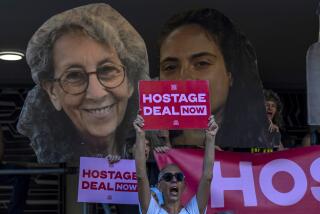Iraq Takes More Territory Before U.N. Cease-Fire
BAGHDAD, Iraq — Heavy fighting was reported Friday in the Persian Gulf War as Iraq launched a major offensive in an effort to seize territory and capture prisoners before a U.N.-sponsored cease-fire goes into effect.
But before the day was out, officials of both countries announced that their foreign ministers would be in New York on Monday in response to a request from Javier Perez de Cuellar, the U.N. secretary general, to discuss terms of a cease-fire.
A military communique read on Iraqi Television said the offensive was “precautionary.” It said the main fighting took place in the central sector along a 110-mile front east of Baghdad.
Thousands of POWs
The communique said that thousands of prisoners had been captured in the fighting and that huge quantities of weapons had been seized.
The fighting erupted less than a week after Iran announced its acceptance of the terms of a cease-fire demanded a year ago by the U.N. Security Council. The Iraqis had expressed skepticism about the Iranian acceptance and called for direct high-level talks with Iran before any truce is formally concluded.
But late Friday the official Iraqi News Agency, quoting a Foreign Ministry spokesman, said that Foreign Minister Tarik Aziz will attend talks called by Perez de Cuellar on implementing the Security Council resolution.
Iran’s U.N. delegate had announced a few hours earlier that Foreign Minister Ali Akbar Velayati will arrive in New York on Monday for the talks.
It was not clear whether Perez de Cuellar planned to bring the two foreign ministers together or meet with them separately.
U.N. Experts En Route
Also Friday, both countries agreed to receive a U.N. team of experts sent to work out the details of a cease-fire. The team is scheduled to arrive in Tehran on Sunday.
Friday’s Iraqi communique said that Iraqi forces had recaptured an area southeast of Baghdad where the war’s first battles broke out in 1980. The area is in disputed territory claimed by both sides.
The communique said the offensive was aimed at regaining Iraqi territory, “destroying the enemy’s forces and capturing many prisoners to balance them with our prisoners as a means (of ensuring) their safe return to their families.”
A prisoner exchange is one of the steps specified in the U.N. cease-fire resolution. According to figures provided by the International Committee of the Red Cross, Iran holds about 50,000 Iraqi prisoners and Iraq holds about 12,000 Iranians, most of them captured in the past three months.
Heavy Fighting Reported
In Tehran, the Iranian press agency IRNA confirmed that heavy fighting was taking place on the central front. It said the Iraqis had crossed the frontier and seized three towns, Sar-e Pol-e Zahab, Khosrowvi and Qasr-e Shirin.
The Iranian communique said the Iranians had been repulsing the Iraqi attacks until the Iraqis “resorted to the extensive use of chemical weapons.” Dozens of Iranians were reported to have been killed by poison gas.
Iraqi Television said President Saddam Hussein had been at the front directing the battle. It said that he returned to Baghdad to report to the ruling Revolutionary Command Council on the latest gains.
“We want to end the war completely,” the Iraqi communique said. “We want enduring and comprehensive peace and not a temporary cease-fire.”
Iran accused the Iraqi government of “creating new obstacles” to the Security Council resolution.
Iraq has expressed concern that Iran will use a cease-fire to rebuild its shattered military forces and then resume the war.
Seeking Full-Scale Talks
The Iraqis want full-scale peace talks to ensure that a cease-fire leads quickly to comprehensive peace in the region.
President Hussein was quoted as saying Thursday in a telephone conversation with Libyan leader Moammar Kadafi that the U.N. resolution could not be considered only a cease-fire. “A cease-fire is part of the resolution and not an isolated case,” Hussein was quoted as saying. “A cease-fire alone cannot stop the war. It can stop it temporarily, but the war would be back worse later.”
The Iraqis maintain that, in demanding direct negotiations with the Iranians, they are only living up to the letter of the resolution, but the resolution does not specify that there are to be face-to-face negotiations.
‘First Step’
It says that “as a first step toward a negotiated settlement, Iran and Iraq (are to) observe an immediate cease-fire, discontinue all military actions on land, sea and in the air, and withdraw all forces to the internationally recognized boundaries without delay.”
Iraq is suggesting that the foreign ministers of the two countries meet at U.N. headquarters to discuss the means of implementing the cease-fire. Iran appears ready at this time to meet only with U.N. officials.
Diplomats in Baghdad said they believe that the war has passed into its final stages, but they cautioned that they expect protracted diplomatic posturing and even large-scale fighting before an actual truce.
Virtual Concession
The diplomats said that a broadcast Wednesday by Iran’s spiritual leader, the Ayatollah Ruhollah Khomeini, making what amounted to a virtual concession of defeat, had done much to convince the Iraqis that the Iranians genuinely want a cease-fire.
Because of Iraq’s perceived strength, bolstered by a series of battlefield victories in recent weeks, diplomats said that President Hussein will probably try to get the maximum advantage out of Iran’s acceptance of the cease-fire resolution.
More to Read
Sign up for Essential California
The most important California stories and recommendations in your inbox every morning.
You may occasionally receive promotional content from the Los Angeles Times.










